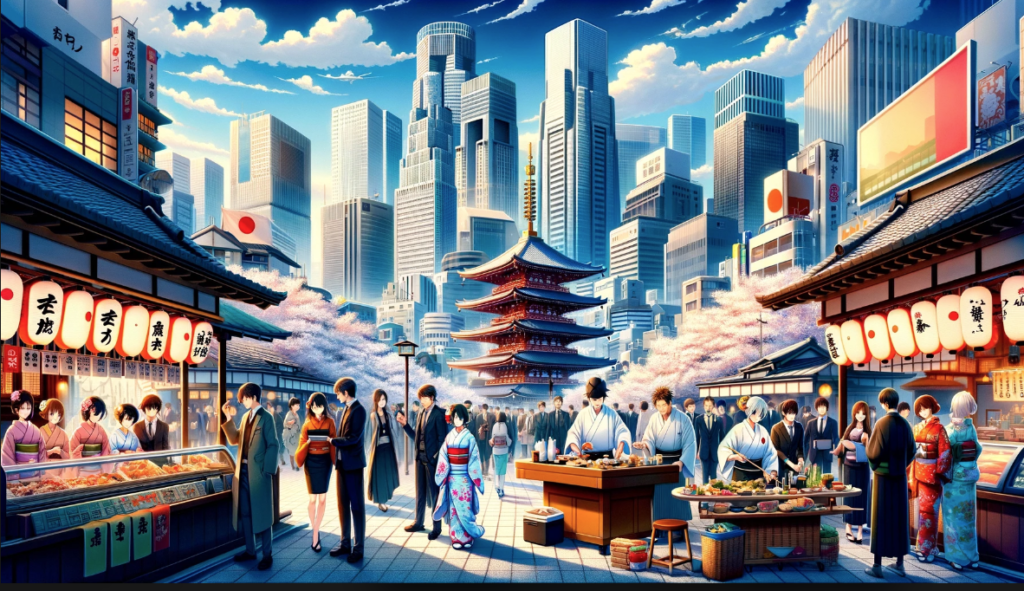
Lesson 24 Tokyo
Topic Question: What makes Tokyo unique compared to other major cities around the world?
No. 1: Introduction – First, try answering the question yourself.
The instructor will provide advice on vocabulary, grammar, and expression corrections.
Sample Answer: – Let’s read aloud – The instructor will check your pronunciation and accent.
Tokyo, the bustling capital of Japan, stands out among the world’s major cities for
its distinctive blend of ultramodern and traditional elements. This city is a place where skyscrapers and cutting-edge technology coexist harmoniously with ancient temples and tranquil gardens. Tokyo’s uniqueness is also evident in its cultural vibrancy, from the world-renowned cuisine that includes sushi and ramen to its significant contributions to global pop culture through anime, manga, and fashion. Furthermore, Tokyo’s public transportation system is unparalleled in terms of efficiency and cleanliness, making it an exemplary model for urban planning. Another aspect that sets Tokyo apart is its resilience and innovative approach to urban challenges, including earthquake preparedness and sustainability. The city’s blend of high-tech innovations, deep-rooted traditions, cultural diversity, and social harmony makes it a unique urban marvel on the global stage.
No. 2: Vocabulary Building – 5 Words to Learn and Their Meanings
Pronounce the Words Correctly (Pronunciation Training) + Make Sentences Using the Words Instantly
1. Ultramodern (超現代的, chō gendai-teki): Extremely modern and advanced in technology or design.
“Tokyo is known for its ultramodern architecture, showcasing the latest advancements in design and technology.”
2. Harmony (調和, chōwa): The quality of forming a pleasing and consistent whole.
“In Tokyo, ancient traditions and modern innovations exist in harmony, creating a unique cityscape.”
3. Cuisine (料理, ryōri): A style or method of cooking, especially as characteristic of a particular country, region, or establishment.
“Tokyo’s cuisine, ranging from street food to Michelin-starred restaurants, reflects the city’s cultural diversity.”
4. Resilience (回復力, kaifukuryoku): The capacity to recover quickly from difficulties; toughness.
“Tokyo’s resilience in the face of natural disasters, such as earthquakes, is commendable and a subject of global interest.”
5. Sustainability (持続可能性, jizoku kanōsei): The ability to be maintained at a certain rate or level; avoidance of the depletion of natural resources to maintain ecological balance.
“Tokyo’s efforts towards sustainability are evident in its policies and practices, aiming for a greener and more sustainable urban environment.”
No. 3: Key Idiom and Example Sentences
“Melting pot” (人種のるつぼ): A place where different peoples, styles, theories, etc., are mixed together.
“Tokyo is a melting pot of cultures, where traditional Japanese customs blend with influences from around the world.”
No. 4: Discussion and Exchange of Opinions on the Sample Answer
Instructor: Based on the sample answer, how do Tokyo’s unique characteristics influence its role in the global community, and how do they contribute to the city’s identity?
Student: [Opinions of students]
No. 5: Free Discussion on the Topic
Let’s explore more about what makes Tokyo unique. Discuss how Tokyo’s blend of tradition and modernity affects the daily lives of its residents and visitors. Consider how the city’s cultural and technological advancements have impacted global perceptions of Japan. Additionally, talk about the challenges Tokyo faces, such as population density and urbanization, and how the city addresses these issues. How does Tokyo maintain its cultural heritage while continually evolving to meet the future? Finally, share your thoughts on how Tokyo’s example can inspire other cities worldwide in terms of innovation, cultural preservation, and sustainability.







